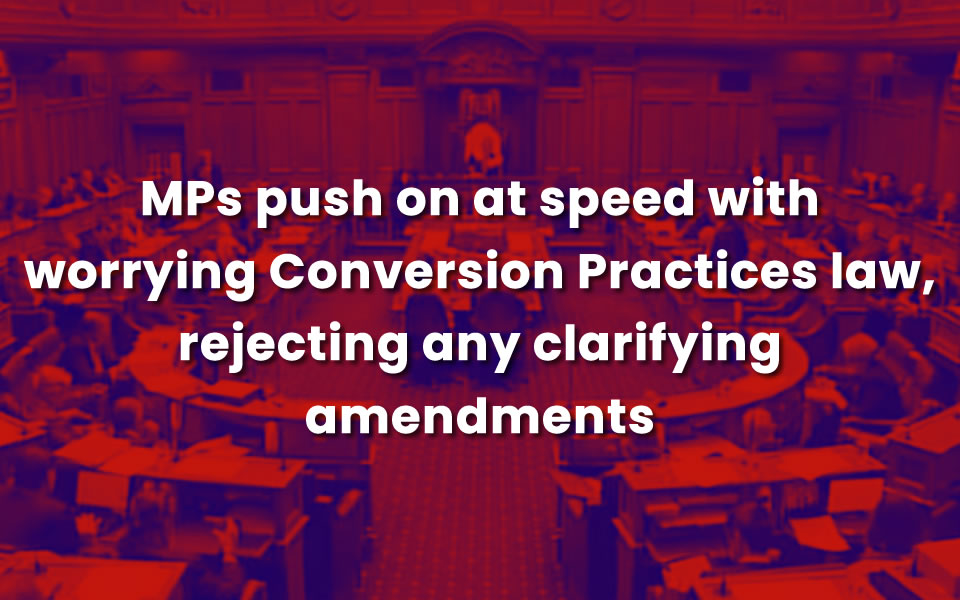What has happened?
While the country has been preoccupied with other matters, including the somewhat chaotic protest outside Parliament, inside Parliament the Government has this week pushed through the second reading and committee stage of the Prohibition Practices Prohibition Legislation Bill, in the space of just two evenings. The third and final reading is expected soon.
Political realities
None of this is a surprise. The Bill fulfills a promise in the Labour Party’s election manifesto. Labour has a large majority, the Bill is a Government Bill, and all Labour MPs have no choice but to vote for it. Also, the Greens and Māori parties have also bloc-voted for the Bill.
The select committee process was in some respects a hollow process: most members of the Justice Committee seemed unwilling to respect or accommodate the concerns of many thousands of submitters.
A number of helpful amendments were suggested, but do not appear to have been seriously considered by the Justice Committee.
The amendments that a few courageous MPs put forward at the third reading were quickly voted down, after minimal debate (but most amendments were supported by ACT and by the majority of National MPs).
None of this has looked like open, collaborative, fair-minded democracy. It has looked more like power politics.
Is the new law good or bad?
At one level, almost everyone agrees with the core stated purpose of this new law: to ‘prevent harm caused by conversion practices’ (i.e. by banning ‘conversion practices’ related to sexuality and gender identity). In principle, that is fine: any law should rightly help protect people against harm, including harm from therapies which are coercive and demeaning.
But because various appropriate behaviours are not clearly excluded in the application of the law, the effect of the law in some circumstances will be to inhibit parents, counsellors, health professionals, church leaders and others from offering advice, support, and prayer – even when that is sought – for fear of being criminalised for any words or actions which could be construed as ‘intended to change or suppress a person’s sexual orientation, gender identity, or gender expression’.
The new law thus denies the right of some people to request and receive the help they want.
In not specifically excluding prayer, the law compromises freedom of religion and the separation of church and state.
Presumably everyone also agrees with the second stated purpose of the new law: to ‘promote open and respectful conversations about sexuality and gender’.
The big question, though, is whether the new law will in practice promote open conversations or instead restrain them. As worded, the law does not clearly enough distinguish between ‘harmful’ conversion practices and open-ended and respectful conversations in the contexts of family, counselling, and pastoral support.
There is no doubt that the law will freely allow conversations that favour same-sex orientation and gender transition. But it appears to discourage conversations that might express any cautions about those. This appears to compromise the New Zealand Bill of Rights’ guarantee of freedoms of thought and expression.
Can the reassurances be trusted?
We are not very sure about that. The Minister of Justice has insisted that many things would ‘not be captured’ by this law, and that clarifying amendments were therefore ‘unnecessary’. But many people feel that if something is not intended to be captured by the law, it should be very clearly stated in the wording of the law itself.
We were disappointed that no amendments were achieved, and that the widely-accepted NZCN proposed amendment was not taken up by any MP (as this addressed some key problems in the Bill).
[in this Act, conversion practice does not include— ]
(g) respectful and open discussions regarding sexuality and gender, and advice, guidance, prayer, or support given to anyone by anyone else including parents, family members, friends, counsellors, religious leaders, or health professionals, when such advice or support is requested, and is respectful and non-coercive.
How will this law be applied?
Time will tell. It is possible this law will be applied only to undoubtedly harmful and extreme cases of actual conversion therapy. It is equally possible that this law is deliberately intended as deep social engineering, and that, as the years go by, this law will increasingly be applied to what many New Zealand people would see as perfectly acceptable examples of opinion, belief, advice, and parental guidance. The scope and meaning of the law will no doubt be tested in the courts, with considerable pain for all involved.
How will Christians generally respond to the new law?
Some will not be very aware of it. Some will welcome it. Many will continue to have significant reservations. Most will continue to live and work within the rule of law. Most will also continue – as now – to have nothing to do with any uninvited, coercive, demeaning, or harmful pastoral practice. Some church denominations will write careful guidelines.
If the law starts to be inappropriately applied to legitimate expressions of belief, parenting, advice, pastoral care, and prayer, under God many Christians will ultimately follow their own godly conscience.









0 Comments